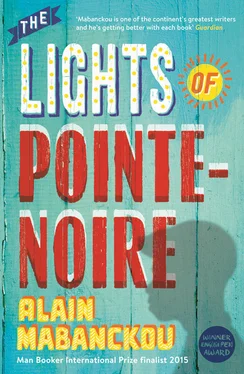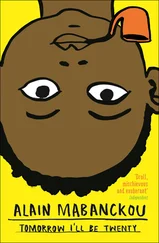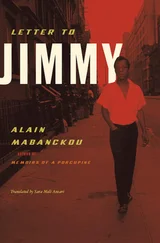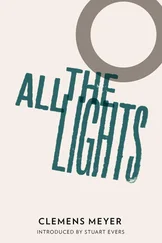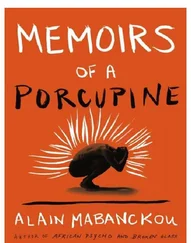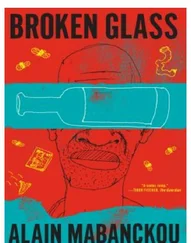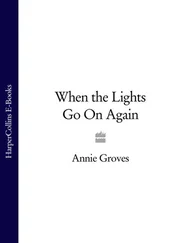These children, though, find points of light in the harshness of their lives. It took me a while to understand that they were just as happy as I was when I was their age, and found my happiness in a plate of hot food in the kitchen, in the growing grass, in the tweeting of a couple of courting birds, or in the poster for an Indian film showing at the Rex cinema, where we started queuing at ten in the morning in the hope of getting into the three o’clock showing. The difficulties of our parents’ lives were something quite distant, and besides, we had confidence in them, they cleverly concealed their anxieties, the shortages, the difficulty of getting through to the end of the month, so as not to spoil our childish innocence.
Thinking back to my childhood, when we hid in the lantana fields near the Agostinho Neto airport and hunted iridescent beetles or fished for minnows from the banks of the River Tchinouka, I replied to my friend, with his ‘Parisian Negro’ arrogance:
‘These children aren’t in a paradise of poverty. Here, look at the photo: that tyre, those flip-flops… that’s what makes them happy… flip-flops to walk in, the tyre they can all climb aboard like a motorbike big enough to carry all their wildest dreams. Every day my nephews and nieces walk out in a long line down the rue du Louboulou. Their childhood knits them together, they wouldn’t swap it for all the world. They drink from a small glass, but it’s their own. Your glass is big, but it’s not yours, and each time you want to drink from it, you have to ask for permission. And alas, that permission is never granted…
His real name is Alphonse Bikindou, but we call him by his nickname, though no one knows what it means or where it comes from: Grand Poupy.
I meet him this afternoon at my mother’s place and it seems his face has not a wrinkle, and that he’ll stay exactly as I’ve always known him till the day he dies: quite small, a prominent forehead, narrow eyes sparkling with intelligence and cunning. He now has a thin moustache, and to take myself back to when I was a kid, only slightly younger than him, I try to ignore his facial hair, which puts a barrier between us. He is my mother’s cousin, and moved to Pointe-Noire from the country in the late 1970s, to live with us and go to the lycée. The very first day I saw him, I was captivated by his deep voice and his way of articulating almost every word separately. I started secondary school just as he started at the lycée, and we’d get up in the morning and put on our school uniforms, him all in khaki, with long trousers, me in a sky-blue shirt and dark blue shorts, and a red ‘pioneers of the Congolese Revolution’ kerchief round my neck. I always lagged behind him, and every now and then he would turn round, so I’d have to hurry to catch him up. I could never manage it, his little legs had a kind of almost mechanical strength despite the way the road seemed to get steeper and steeper, so that we would overtake other pupils sitting exhausted by the wayside. A bit farther on, at the junction of the Avenue Jean-Felix-Tchicaya and the rue Jacques-Opangault, where we went our separate ways, he would act the big brother — he was no longer a minor — and tell me to mind the traffic and hand me a twenty-five CFA franc coin:
‘Buy yourself some fritters and mash at break. Watch the big kids don’t steal your money.’
As he walked off, I’d stand and watch him for a moment, making his way down to the far end of the avenue to where the Karl Marx lycée stood. After a few minutes he was no more than a tiny speck, absorbed into the crowd of students. Then off I went to the Trois Glorieuses secondary school. I arrived just in time for the raising of the flag in the schoolyard, when we all sang the national anthem, which we were made to learn by heart:
Arise, brave country,
Who, in three glorious days,
Seized the flag and raised it
for a Congo, new and free
That never more will stumble
And no more be afraid.
Our chains we have burst open,
Now freely we will work
We are one sovereign nation.
If my foes do slay me,
Before my hour has come,
Brave comrade, take my gun;
And if a bullet hits my heart
Our sisters all will fearless rise,
Hills, river, too, with all their might
Will repel the invader.
Today our land is born anew,
And all in value equal,
No leader but the people,
Who alone has chosen
To stand in dignity.
Grand Poupy favoured white shirts and terylene trousers, which he ironed energetically every weekend. He cut his own hair, in the style of the Afro-American actors of the 1970s, whose posters we fought over on the Avenue of Independence, where they were laid out for sale on the ground outside the Rex, the Duo and the Roy.
The layout of the interior of our three-room house changed with the arrival of my mother’s cousin. By now it was a really tight squeeze, with my aunts Sabine Bouanga and N’Soni in one room, and my parents in the other. Any other member of the family who happened to turn up had to find a corner in the living room to lay down a mat, without getting too close to where Uncle Mompéro had set up his bed and would not be moved. Grand Poupy’s arrival would upset my routine. I no longer slept with my uncle, and chose instead to share the mat with the latest arrival, listen to him relate amorous escapades, which of course always ended with victory for him and the surrender of his lady-love, as long as Uncle Mompéro didn’t complain and tell us to shut up. Grand Poupy would lower his voice, while my uncle ranted from his bed:
‘I can hear you, Poupy, you’re keeping me awake! If you don’t shut up I’ll wake up the boy’s mother and you can explain yourself to her! Ever since you got here you’ve been filling his head with your lies! Has anyone ever seen these girls you’re always boasting about?’
At this point Grand Poupy would whisper to me:
‘Let’s go to sleep, I’ll tell you the rest tomorrow. Uncle Mompéro doesn’t know Grand Poupy, ladies’ man extraordinaire!’
On days when there was no school, he would suggest we take a walk in the neighbourhood:
‘I’ll show you how to approach a girl, just watch what I do! As soon as I see a girl, I’ll go up and talk to her. There’s one sign that’s always a giveaway: if I put my hand on her right shoulder and she doesn’t remove it, things are looking good…’
We were standing at an intersection about two hundred yards from the house, a strategic spot from which we could see most of the girls in the Vongou neighbourhood pass by. They were on their way to market, some dressed in multicoloured pagnes, others in tight-fitting trousers, with tops that bordered on indecent. If my mother’s cousin liked the look of one of them, he would turn up the collar of his shirt, smooth his Afro with the palm of his hand, and quickly spray some perfume under his armpits, behind his ears and even inside his mouth:
‘Don’t move, I’m coming back!’
He’d set off after the girl, imitating almost to the point of caricature the manner of Aldo Maccione, who he’d seen in L’Aventure c’est l’aventure .
I watched from a distance as Grand Poupy hitched up his trousers, smiling his broadest smile and finally placing his hand on the girl’s right shoulder. He would turn back to me and wink. Seeing his conquest didn’t shake off his hand, I decided Grand Poupy must be right, he was an ace, and his technique was infallible. What would have happened if the young lady had removed his hand? I had complete faith in his ability to come up with a response. He’d probably already encountered more difficult cases, and knew instinctively which girls he could target and be sure of success. So, I decided, he wouldn’t risk it if he thought there was a chance he’d be rejected. Why, for instance, did he tend to go for the ugly ones, when a real beauty might be passing just a few centimetres away, flashing us her most provocative smile? If I ventured to question him on this matter, he would say, with an air of great experience:
Читать дальше
